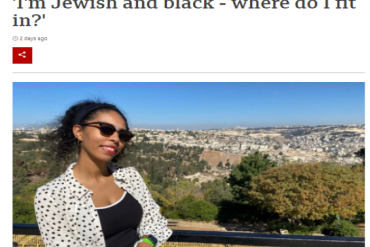1) At Mosaic magazine Professor Eugene Kontorovich explains “The Many Incoherences and Hypocrisies of International Law on Jerusalem”.
“Under the uti possidetis principle, then, Israel’s borders at the moment of independence are quite clear: the borders of Mandatory Palestine. Those borders include all of Jerusalem, and Judea and Samaria as well. The UN, in its thousands of resolutions to the contrary, flagrantly ignores that principle.
This conclusion is not affected by the UN General Assembly’s partition proposal, adopted as Resolution 181 in November 1947, that provided for the formation in Palestine of two states, Jewish and Arab, with the city of Jerusalem designated a separate internationally-administered entity (the corpus separatum). That is not only because the UN proposal was a non-binding recommendation, but because, having been rejected by the Arabs, it was never implemented and did not in fact result in a partition of the Mandate. Uti possidetis goes by the prior administrative borders as they were, not as they might at various times have been imagined to be.”
2) MEMRI documents the broader background to a speech from a senior Hamas figure which was recently ignored by the BBC: “Hamas Official Fathi Hamad’s Speech Was No Exception”.
“After a July 12, 2019 speech by Hamas political bureau member Fathi Hammad urging Palestinians to kill Jews all over the world sparked outrage, Hamas issued a clarification stating that his statements did not reflect the movement’s official positions and that Hamas’s struggle is against the occupation, not against Jews around the world or the Jewish faith.
However, MEMRI publications from the past two years show that statements by Hamas members and officials, and content published by Hamas’s official media, have been rife with antisemitism. […]
It should be mentioned that all of these statements were made after Hamas published its May 1, 2017 policy document aimed at presenting the movement as pragmatic, democratic, and tolerant. This document was also aimed at distancing the movement from the antisemitic statements that appear in its charter (although it does not supersede the charter), by stating that Hamas does not fight the Jews as such, but only the Zionist occupation.”
3) The ITIC takes a look at a topic serially under reported by the BBC – “Summer Camps in the Gaza Strip”.
“In the past UNRWA organized and funded some of the summer activities for the children in the Gaza Strip. However, in recent years UNRWA suspended its activities because of financial problems. The vacuum was filled by Hamas and the PIJ, which increased their summer camp activities accordingly. In the past Hamas summer camps were organized by the ministries of education and the interior. However, in recent years, with the formal addition of military training to the high school curriculum (“al-Futuwwa”), organizing the summer camps was turned over to the military wings of Hamas and the PIJ (to continue al-Futuwwa training). Apparently the transition had a direct influence on the summer camps’ programs and more emphasis is currently placed on indoctrination and paramilitary training. […]
Hamas’ summer camps are expected to open on July 20, 2019. The camps, called Pioneers of Liberation, are supervised by Hamas’ military wing, and their theme is “Going to Jerusalem”.”
4) Jonathan Spyer analyses the Iraqi prime minister’s announcement of the integration of Shia militias into the Iraqi security forces.
“The Shia militias are the main instrument of Iranian policy on Iraqi soil. Not all groups involved in the 150,000 strong PMU are Iran-linked, but the largest and most consequential groupings are. These include the Badr organization, led by Hadi al-Ameri, Ktaeb Hizballah, headed by Abu Mahdi al-Muhandis, Asaib ahl-al Haq, and Hizballah al-Nujaba.
All the above mentioned groupings are franchises of Iran’s Islamic Revolutionary Guards Corps (IRGC). All were established by and are controlled by Iran, answering directly to the IRGC’s Qods Force and its leader, General Qassem Soleimani. […]
The militias are powerful players – politically, militarily and economically. Prime Minister Adel Abd al Mehdi, meanwhile, is a weak figure with no real power base of its own. Iraq is not a country ruled by law. The prime minister as a result simply possesses no coercive mechanism for imposing his will on the Shia militias. He can order their dissolution if he so wishes. The result will be the further enmeshing and fusing of the militias with the official bodies of the state – without the ceding by the latter of their own vital chain of command. This chain of command leads to Qassem Soleimani, and thence to the office of Iranian Supreme Leader Ali Khamenei.”



